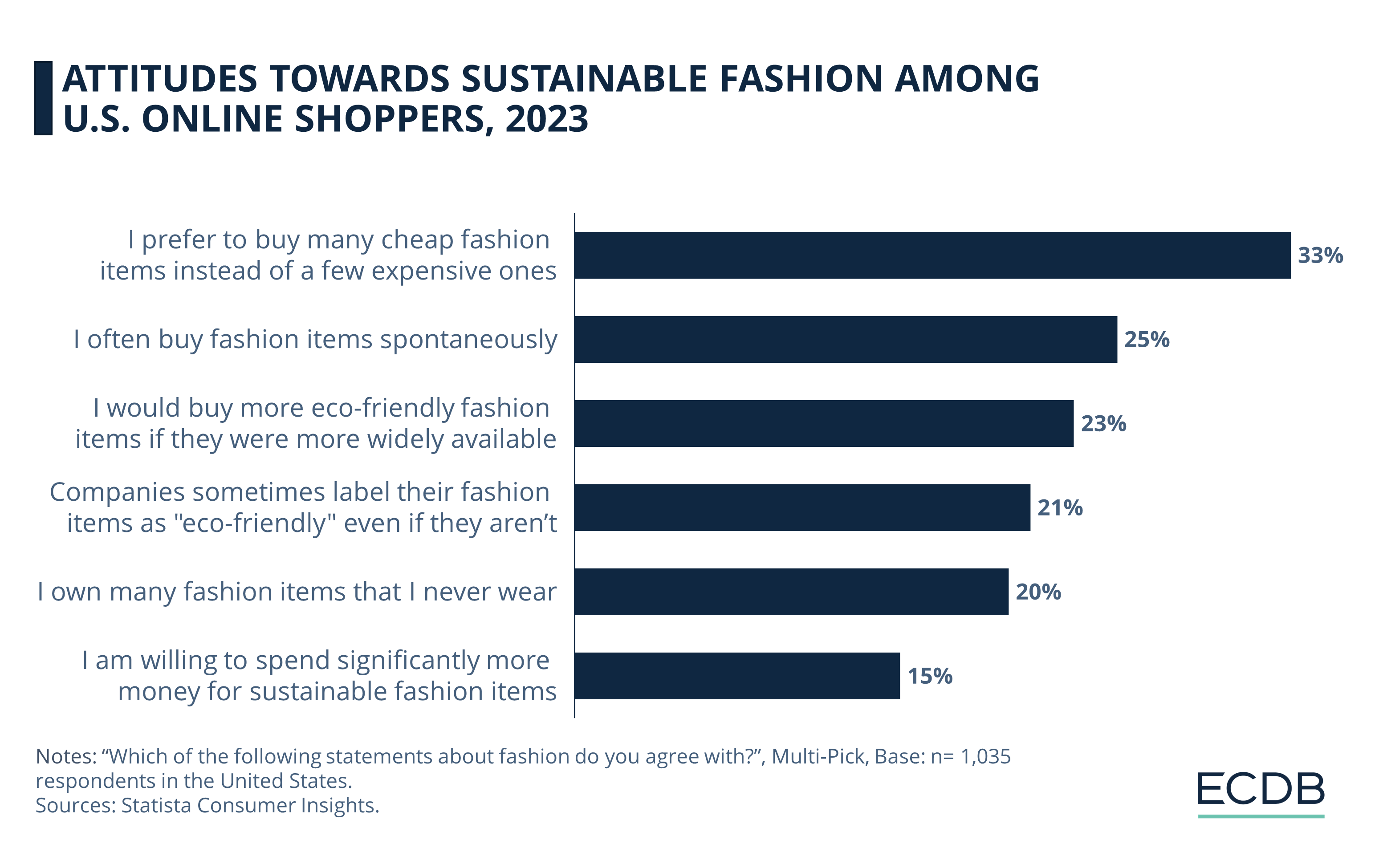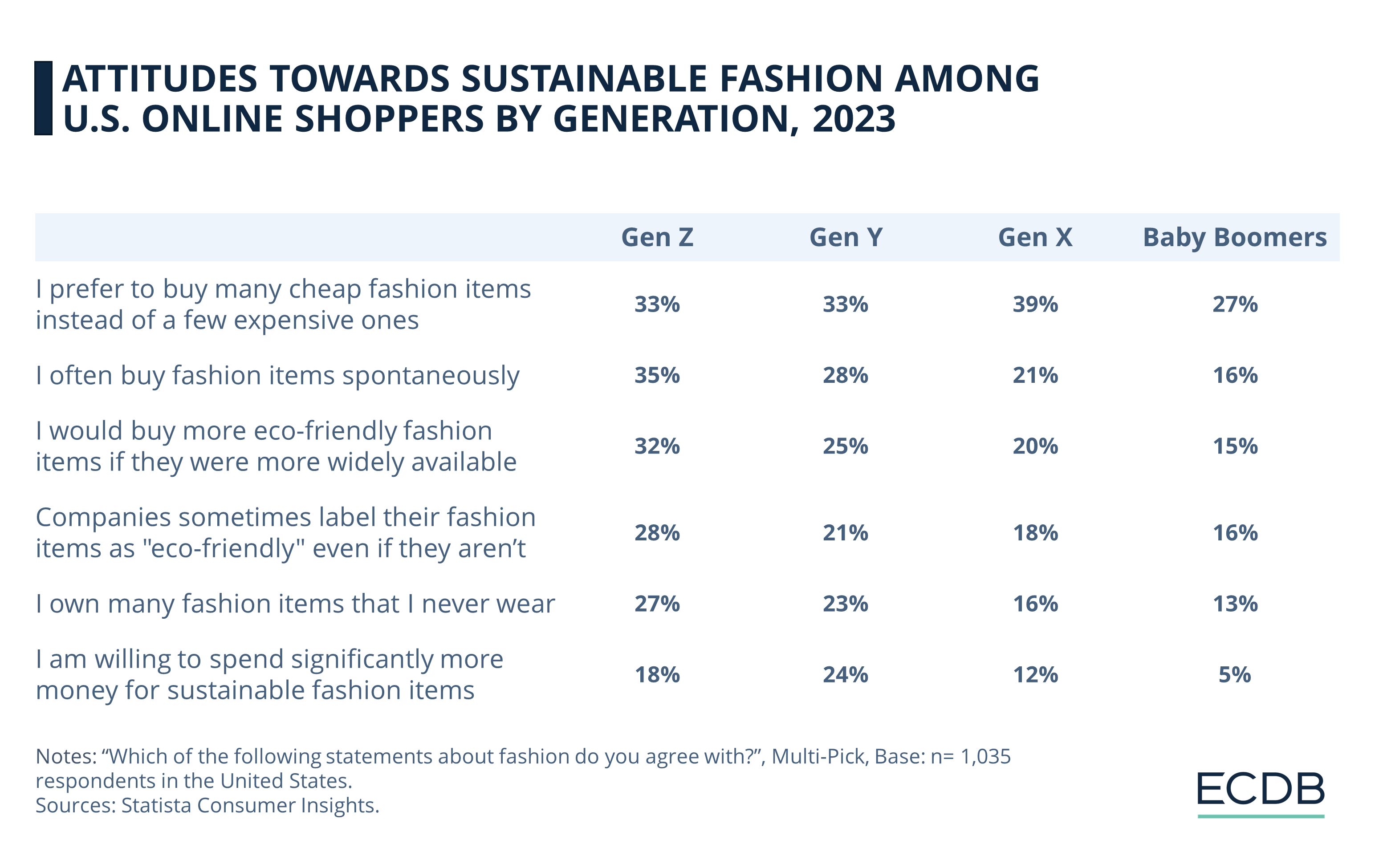eCommerce: Shopping Behavior
U.S. Online Fashion Attitudes: Fast Fashion, Greenwashing & Pricing
Sustainability has become a buzzword of every industry, including online fashion. In U.S. eCommerce, one of the leading global online markets, fashion products belong to the most frequently bought categories. But a conundrum emerges: The popularity of cheap fashion and eco-friendliness. What do U.S. consumers think? Find out here.
June 14, 2024Download
Coming soon
Share

Online Fashion Attitudes: Key Insights
Price Over Sustainability: The majority of U.S. consumers prioritize low prices over sustainability in fashion, with one-third preferring to buy many cheap items instead of a few expensive ones, and only 15% willing to spend significantly more on sustainable products.
Generational Differences: Younger consumers, especially Gen Z and Millennials, are more aware of greenwashing practices and are more inclined to buy eco-friendly fashion if available, but they also engage more in spontaneous purchases and own items they never wear.
Fashion Paradox: Despite calling for sustainable products, many consumers, particularly younger ones, still prefer cheaper options and impulse purchases.
Clothing and footwear belong to the most frequently purchased items in U.S. eCommerce. But fashion eCommerce is increasingly being criticized for the rise of cheap products flooding the market, greenwashing practices and unnecessary waste production.
Here is how U.S. consumers think about sustainability issues in fashion.
Sustainability Attitudes in Fashion: Price Is Most Important
A 2023 survey by Statista asked U.S. consumers about their attitudes towards sustainability in fashion. The results show that most consumers value price over everything else:

One-third (33%) of respondents said that they prefer to buy many cheap items than a few more expensive ones.
25% of consumers in the survey say they buy fashion items spontaneously.
Another 23% of respondents would buy more eco-friendly fashion products, if they were more widely available.
21% of consumers are aware of greenwashing practices, saying that sometimes companies label products as eco-friendly or sustainable when in reality they aren't.
20% of survey respondents admit to owning fashion items they never wear.
Only 15% of consumers are willing to spend a significantly higher amount of money on sustainable fashion products.
There are some generational tendencies to these answers. Check them out here.
Generations in the U.S.: Younger Users More Susceptible to "Fashion Paradox"
Most of the displayed statements follow a clear correlation, meaning that agreement is likelier the older or younger a respondent gets:

Negative Correlation means that younger respondents are more inclined to agree. This applies to spontaneous fashion purchases, buying more eco-friendly fashion if it is available, greenwashing, and not wearing some of the fashion items one has bought.
Unclear Correlation follows no specific pattern. In this case, Gen X are most likely to buy more cheap items instead of a few expensive ones (39%). Millennials/Gen Y respondents are most willing (24%) to spend significantly more money on sustainable fashion products.
The greenwashing aspect (companies sometimes falsely labeling their fashion items as "eco-friendly") is particularly noteworthy in combination with other statements: Gen Z are most likely to agree that some fashion companies practice greenwashing (28%), followed by Millennials (21%), while Gen X (18%) and Baby Boomers (16%) tend to agree less.
At the same time, a similar tendency appears for the readiness to buy more sustainable items if they are available: More Gen Z (32%) and Millennials (25%) agree than Gen X (20%) and Baby Boomers (15%). A cheap price certainly plays a role, considering that many Gen Z respondents are at university or comparably new employed. But awareness of greenwashing is also important: A sustainability label does not always mean the products are indeed ecologically friendly.
The "Fashion Paradox" is a term addressing the attitude-behavior gap in fashion: On the one side, users call for more sustainable products and waste reduction. On the other, most consumers are not willing to pay more for eco-friendly products or find they do not look good.
The survey data shows that younger users tend to be more susceptible to the fashion paradox: They show higher agreement rates with sustainability statements, but are also highest in their preference for cheap products, impulse purchases and not wearing the fashion products they buy.

U.S. Online Fashion Attitudes: Wrap-Up
A green label is not enough, several factors have to come together to make a fashion product interesting to consumers: The most important aspect is the cheap price. The data shows that especially younger consumers tend to be aware of greenwashing practices. Some of them would buy more sustainable products if available.
More Insights? We keep our rankings up to date with the latest data, offering you valuable information to improve your business. Want to know which stores and companies are leading the way in eCommerce? Which categories are achieving the highest sales? Check out our rankings for companies, stores, and marketplaces. Stay one step ahead with ECDB.
For older shoppers, spontaneous purchases are less important and sustainability is not as much of an issue. But older consumers are less likely to buy fashion items they don't end up wearing, which reflects how the fashion paradox is less prevalent among these older cohorts.

Click here for
more relevant insights from
our partner Mastercard.
Related insights
Deep Dive
Next Generation eCommerce: Key Trends Shaping the New Age of Online Retail
Next Generation eCommerce: Key Trends Shaping the New Age of Online Retail
Deep Dive
Google's AI Project Jarvis Could Change Online Shopping
Google's AI Project Jarvis Could Change Online Shopping
Deep Dive
The Customer Journey in Online Shopping: It Begins with Search Engines
The Customer Journey in Online Shopping: It Begins with Search Engines
Deep Dive
TikTok Shop Expands Operation in the United States
TikTok Shop Expands Operation in the United States
Deep Dive
Fast Fashion Online Market: Fast Fashion Is Not Fair Fashion
Fast Fashion Online Market: Fast Fashion Is Not Fair Fashion
Back to main topics